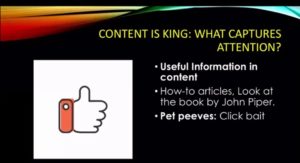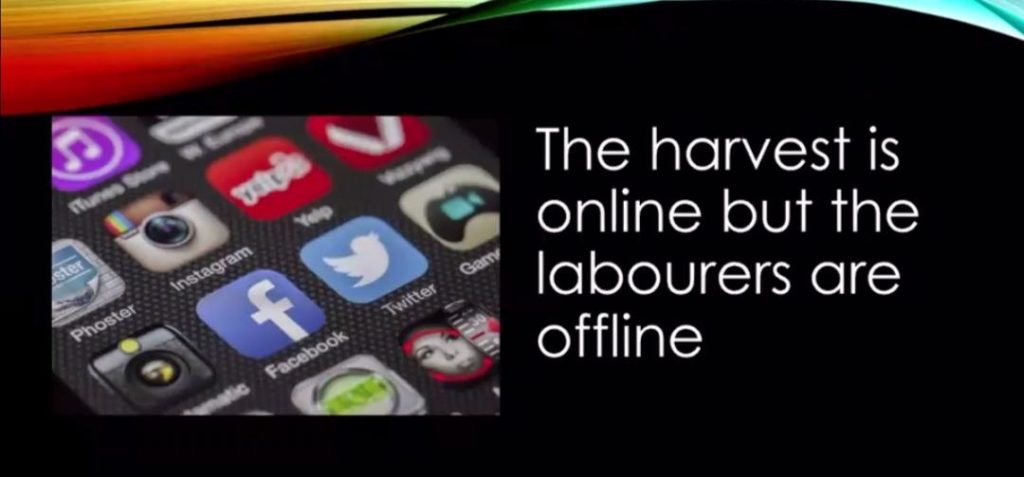Justina Asishana, Niger State correspondent for The Nation Newspapers, Nigeria participated in the How to Write for the Social Media webinar by Media Associate International (MAI) with Ernest Wamboye from Kenya as the speaker. Her report from the session is published below.
“Writing for social media is not an option for any writer, it is a requirement. You may not feel like doing it but you just have to do it”.
“The harvest is online but the labourers are offline”.
“Content is King and Social Media is Queen.”
These were some of the takeaways from the webinar on ‘How to write for the social media’ with Ernest Wamboye organized by Media Associates International (MAI).
Most often than not, a lot of posts on social media rarely draw attention which is why most writers wonder why their social media posts do not always go viral or have a like or share by their audience? According to award-winning Blogger, in writing, just like every other activity we engage in, it should be done with deliberateness as our articles and posts always have impact and effects.
“Your writing has an effect even if you do not see the effect, it is there. Have it at the back of your mind that your writing has an effect.”
The participants were educated on how to define their target audience, given tips for writing for different groups of audiences, how to capture and maintain the attention of the audience with the content on social media and the times of writing for various social media.
Effects of writing for social media
* It creates an impact on your audience and makes you explore what you are afraid to do example stating a blog, blog or an online event.
* It gets you invitations to speak on topics you write about
* You become an authority on the topics treated. Consistent writing can open doors for you as it makes you an authority in your field to be called upon to explain issues around what you write about.
*Blogging can get you awards and recognition which further gives your writing credibility.
Ernest said that as writers, we cannot ignore writing for the social media stressing that it is no longer an option but an obligation, “you may not feel like doing it but you have to do it.
The Five Big Attractions of the Internet
People are attracted to the internet these days because of these five activities as pointed by Ernest. The attractions include –
1) Searching – a lot of people are searching for content on how to improve themselves and the internet gives them that.
2) Sports – this is one of the main attractions of the male audience. They want to know about sports and what the clubs and players are doing
3) Stories – People want to know what is going on around the world, in their country and their communities.
4) Sex – some people go on the internet because of sex, relationship-related content and others
5) Social Media – this is the queen of the internet and almost everyone is on it.
Defining your Target Audience
Ernest explained that to write effectively, it is of utmost importance to define your target audience. This is necessary so that when you write, you know you are speaking to a particular group of people who you have defined and know much about them.
He said the writer can define his audience by giving the audience a name, classifying it by age, education, the language they speak, their beliefs, their status, and their weaknesses.

Tips for writing for various age groups
Age 18 to 30 – These are groups are currently in their learning years and they are still going through a lot of learning.
Their biggest needs include –
* Mentors
*Exposure/Experience
* Understanding self
* faithfulness
* Inner life growth
Ages 30 – 40 – These audiences are in the building age, they are through with learning and are currently building the foundation of their lives.
Their Biggest Needs include –
* Mentors and Peers
* Developing Life Structures
*Applying self to life
*Stewardship
* Feedback for adjustment
Ages 40 – 50 – these are the focusing years. They are through with building and are focusing on stabilizing what they have built over the years.
Their Biggest Needs include –
* Clarifying purpose
* Focusing self on life
* Stewardship
* Intentional Living
Ages 55+ – The Investing Years. These audiences want to make their final years count and look forward to investing their time, resources and energy in others.
Their Biggest Needs include –
* Having Mentees
* Making final years count
* Investing self
*Generosity
* Identifying their legacy
What Content Captures the attention of the audience?
This segment dealt with content and showed how content is key in making social media posts and how the writer can tilt his content to capture and maintain the attention of the audience.
1) Vulnerability in content – the audience expects the writer to be open and sincere. The audience is usually turned off if the contents include harsh lectures and pharisaic.
2) Heroism in Content – the audience loves conviction leaders, idol tumblers and boldness, once your content involves you taking a stand for or against some issue, you have your audience captured. However, the audience is turned off when the writer starts displaying double-mindedness, hypocrisy and turns out to be a jerk.
3) Sensitivity in Content – The audience appreciates when the writer is tuned to what is happening when the writer displays emotional intelligence and humility. It attracts readers to your posts or articles. The audience are thereby turned off when the writer displays a lack of emotional intelligence.
4) Clearity in Content – the writer needs to know that he is writing to express and not to impress. The people want to know what you are saying in your write-ups. Be clear in your words and your statements.
5) Useful Information in content – if your content has information that tells people how to do things or help themselves in some areas they are having difficulty, then you are on your way to capturing and maintaining your audience. Examples include to-do articles and where they could get somethings. However, when the writer adds clickbait to his write-ups, he gradually loses the audience because they feel disappointed when they do not see what the headline speaks about.
6) Entertainment in Content – people love entertaining stories, creativity, memes, and infotainment but it should not be too often or bogus.
7) Brevity in Content – because attention online is short, your writeup should also be short but it should convey the message you want to convey. Earnest suggested short and sweet articles along with audio-visual content but added that if the content is fantastic, the audience can overlook the lack of brevity.
8) Aestheticism in Content – the audiences are always drawn to good pictures and posters in the content, so more of it should be in the content, however, the audience can be turned off by poor quality Pictures and Horrible grammar.
9) Consistency in Content – Writers need to be consistent in their writings and postings on social media, they should have a pattern that the audience can predict. Postings should be done regularly while comments should be replied. Audiences hate dead sites, apologies for not posting often and oversharing.
Social Media is Queen
Ernest gave an insight into how the various social media works and the best time to post content on these media. According to him, posting on Facebook and Instagram is best early in the mornings and early evenings when the traffic is high.
He said that postings on Twitter and Whatapp can be done at any time pointing out that YouTube, Tik Tok and snap chats are tools that a writer should not ignore as it draws more audience to the content.
He added that the signs that the writer has made an impact in capturing and maintaining his audience would be that the people would interact more with his posts.
How to Deal with Social Media Backlash
To round up the webinar, Earnest gave an explanation of how writers can deal with social media backlash.
* Get your identity in Christ – Don’t get into an ego march
* Don’t respond when upset
* Establish the source of the attack. Address the problem with the critic
* Deal with the attack on the same platform
*Respond in the inbox if the matter is getting out of hand
“Respond with humility and within scripture – be above reproach
* If you are wrong, apologize without excuse. It creates humility
* Take corrective action, do not always repeat the mistake.

